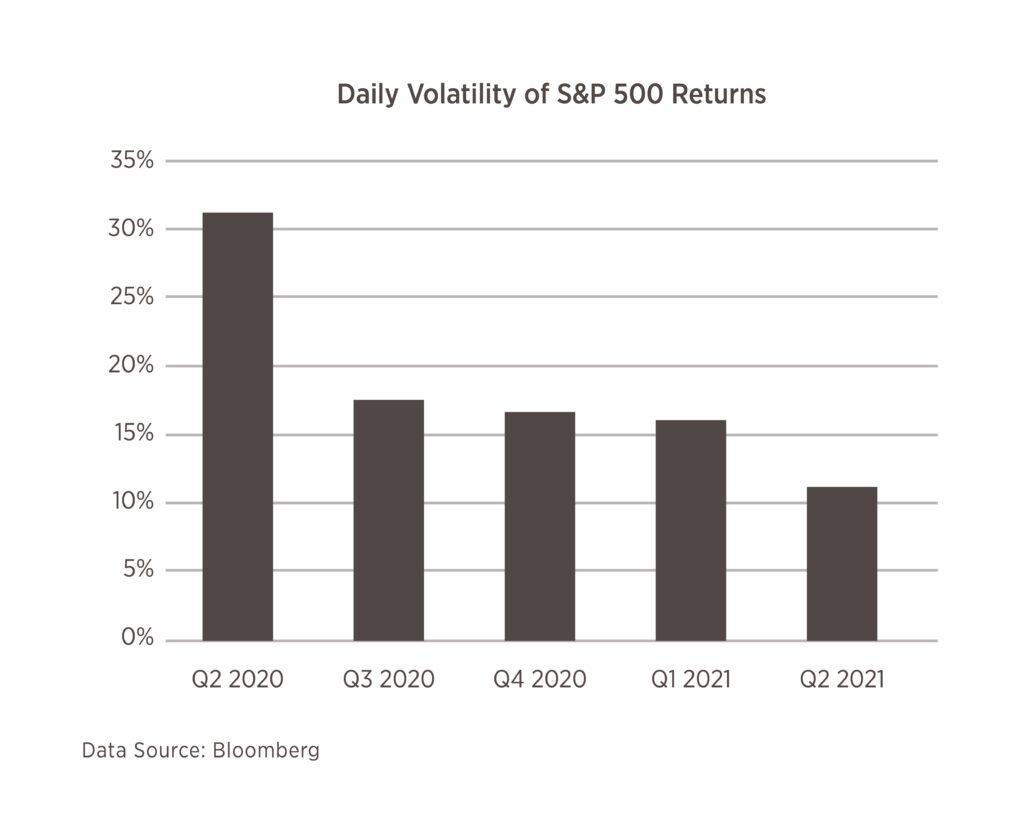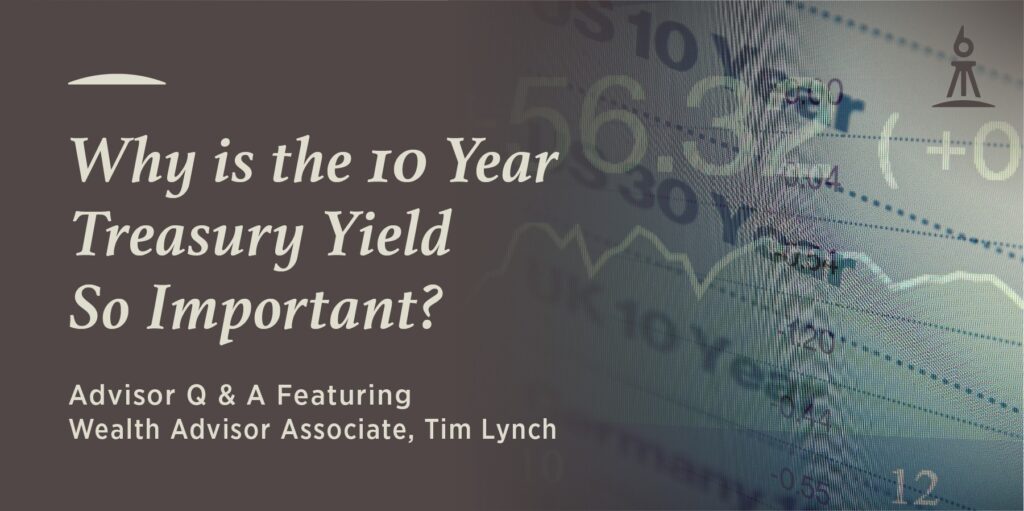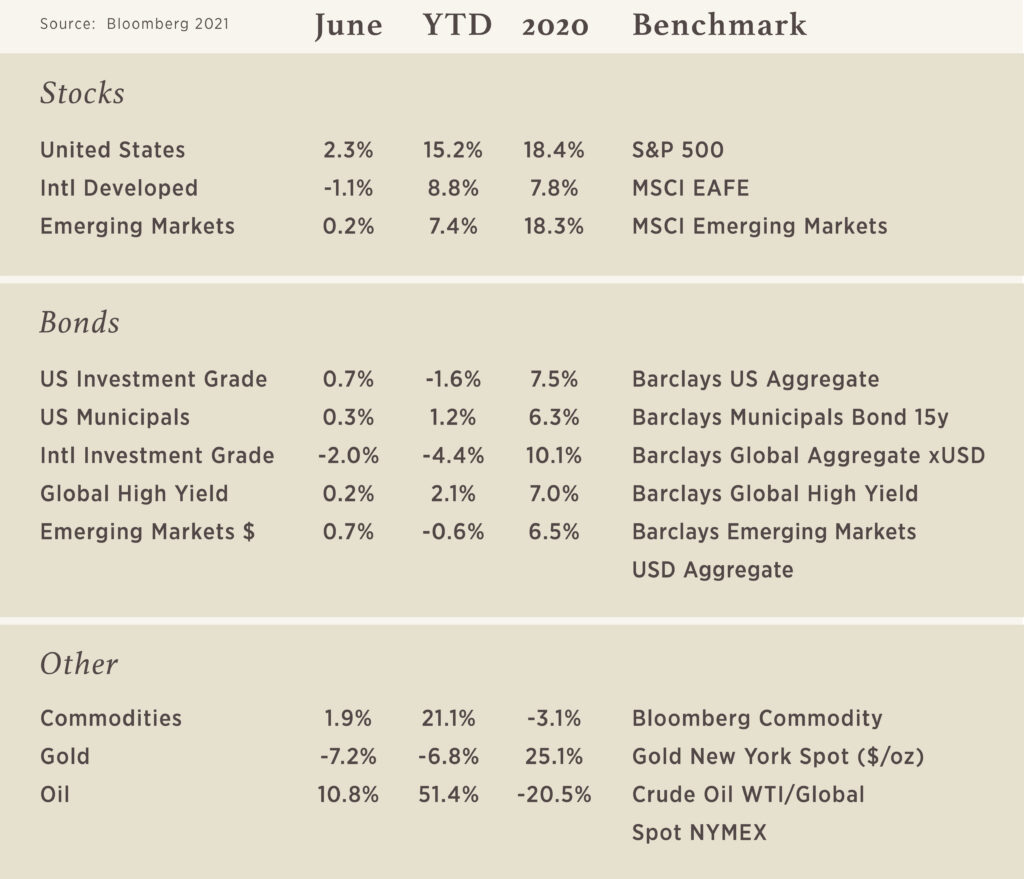
Chart of the Month
As stock markets continue to reach new highs and the country continues its long recovery from the pandemic, one interesting feature in the market is what is not happening. US stocks at the market level are not experiencing large day-to-day swings in price. The S&P 500 index rose by 8% over the most recent quarter, but did so with very little volatility. As this month’s chart shows, that is a departure from the recent past, even as the recovery in stocks gained momentum. The period of calm is surely welcomed by investors, but raises questions of how long it will last.


What is the 10-year treasury yield?
The 10-year Treasury note is a debt obligation issued by the United States Government as a means to help pay for the US debt. Investors in the 10-year Treasury receive interest payments at a fixed rate once every six months until their principal value is returned at maturity. In this case, 10 years. Because they are backed by the full faith and credit of the United States Government, Treasury securities are seen as a safer investment relative to stocks, especially during times of market volatility.
What does it measure and how does it affect YOU?
The 10-year Treasury yield serves as an important economic indicator and is often used as a measure for broader investor confidence. Simply put, rising yield = expectation for more growth, while falling yield = expectation for slowing growth. Under normal economic circumstances, long-term bonds generally pay a higher interest rate than short-term bonds due to an investor assuming more risk over the extended period of time. The higher the yield of the 10-year Treasury, the more optimistic investors are about the economy, which represents a normal yield curve. When long-term yields drop below short-term yields, you will see an inverted yield curve, which often indicates a recession. Treasury yield prices are based on supply and demand, and bond prices and yields move inversely to each other. When investor confidence is high, prices for the 10-year drop and yields rise indicating that investors feel they can find higher-returning investments elsewhere and are willing to take on more risk to do so. Conversely, when confidence is low, bond prices rise and yields fall indicating that there is more demand for safer investments, such as Treasuries.
What are the impacts of the 10-year treasury yield on the housing markets, inflation, borrowing costs, etc.?
Alongside investor confidence, the most direct manner in which Treasury yields affect you is their impact on fixed-rate mortgages. As the 10-year yield goes up, so do mortgage rates and other borrowing rates. In general, interest rates on consumer and business loans will rise as Treasury yields rise. Higher interest rates make housing less affordable, which depresses the housing market and means that potential home owners will be forced to buy smaller, less expensive homes. This, in turn, can slow Gross Domestic Product growth as well.
What have the changes in the 10-year treasury yield taught us as investors?
With investors around the world trying to assess growth and inflation risks, the focus on the 10-year Treasury yield has become that much more important. A mentor of mine likes to refer to the 10-year Treasury note as the “Canary in the Coal Mine” which means it is an important indicator for potential adverse conditions ahead. For quick reference, caged canaries were once used by coal miners to signal for dangerous gases inside their mining tunnels. If carbon monoxide and other dangerous gases built up inside the mine, the gases would kill the canaries before killing the miners, providing a signal for them to exit the tunnels immediately. I know that sounds a bit dire, but it provided a way for the miners to revert back and reassess their situation before progressing forward. The 10-year Treasury can do the same for us when used as a barometer to help clients compare the possible risks and returns offered by different asset classes while keeping a close eye on the spread between short-term and long-term rates. Historically, if the Federal Reserve raises short-term interest rates too far and too fast in response to inflation concerns or tight labor market conditions, we could see a yield curve inversion and a potential sign of a recession.
What to watch in the coming months?
The 10-year Treasury yield fell to its lowest level since February amid signs that the economic recovery from the Covid-19 pandemic has been slowing due to the potential implications of another wave transmitted by the new Delta variant. We’ll see how this sentiment continues to play out this month at the Olympic Games in Tokyo, Japan and throughout the remainder of the year. For now, keep an eye on investor confidence with the changing values of the 10-year Treasury.


